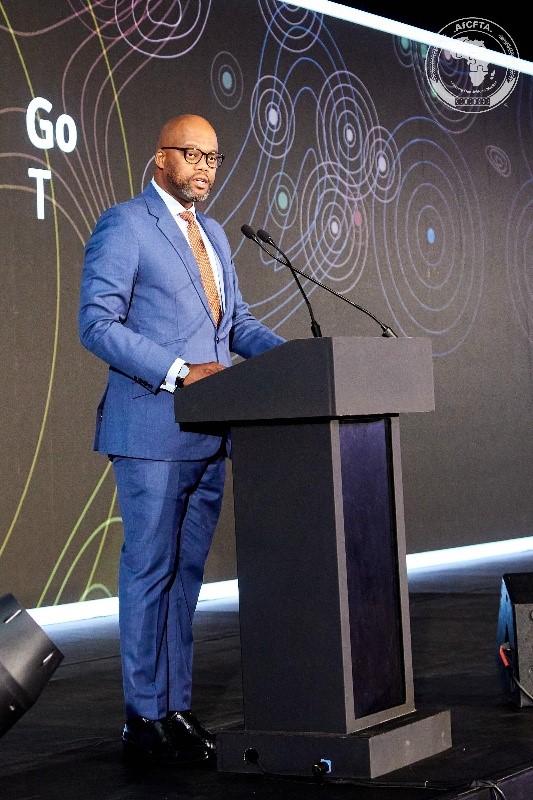Speech by Wamkele Mene, Secretary General, African Continental Free Trade Area (AfCFTA) Secretariat at 2025 Mining in Motion Summit
We meet at a time of profound global uncertainty, marked by shifting geopolitics, rising protectionism, and persistent trade and financial fragmentation.
The lingering impacts of pandemics, climate shocks, and inflation have further exposed deep vulnerabilities in global supply chains. In this evolving environment, Africa must respond with clarity and unity.
This imperative is reinforced by ongoing strategic competition, increasingly defined by ‘me-first’ policies.
This dynamic makes it all the more urgent for Africa to deepen continental integration, strengthen resilience, and assert its economic interests more boldly on the global stage, especially as changes in global trade policies, including the uncertain future of AGOA, could significantly affect our economies.
Thankfully, the operationalisation of the AfCFTA offers a transformative opportunity to drive growth and sustainable development from within. It is a home-grown initiative rooted in Africa’s own vision for prosperity.
As a flagship project of Agenda 2063, the AfCFTA embodies our collective ambition to boost intra-African trade, foster industrialization, and enhance our global economic influence. Key to the success of this agenda is digitalisation.
Digital technologies are not only enablers, they are the lifeblood of Africa’s emerging integrated economy. They provide the efficiency, transparency, and connectivity essential to realising the full potential of the AfCFTA.
With the AfCFTA Protocol on Digital Trade now fully adopted, and as we shift from negotiation to implementation, the theme of my address: “Gold Without Borders: Tokenization and the Next Chapter in African Trade”; could not be more timely. It speaks directly to how Africa can harness digital innovation to transform traditional sectors like mining.
Gold tokenization offers a practical demonstration for operationalizing the AfCFTA’s digital framework: reducing transaction costs, boosting intra-African trade, improving traceability, and enhancing financial inclusion. This not only reinforces the AfCFTA’s commitment to value addition and rules-based trade, but also serves as an example of the forward-looking, inclusive innovation we must champion across our continent.
This is not just about gold, it is about redefining the future of African trade in the digital age.
For us at the AfCFTA Secretariat, today’s dialogue is especially important. It directly builds on the momentum of our recent and highly successful Digital Trade Forum 2025, held in Lusaka, Zambia. The Forum was dedicated to operationalizing the Protocol on Digital Trade under the theme: “Boosting Digital Trade to Accelerate AfCFTA Implementation”.
The Forum reaffirmed Africa’s digital trade potential, political commitment, and country readiness, while laying vital groundwork for capacity-building, especially for SMEs, women, and youth. It underscored the urgent need for interoperable systems and harmonized regulations to establish a trusted continental digital market. This momentum makes today’s dialogue both timely and strategic.
Africa is a major gold producer, contributing over 1,000 tonnes in 2023; more than 27% of global output. This represents a significant source of wealth, with a large share coming from artisanal and small-scale mining, particularly in countries like Ghana.
Howver, despite this wealth, up to 40% of Africa’s gold remains undeclared, with an estimated $30 billion smuggled annually. This deprives governments of vital revenue, undermines ethical sourcing, and limits miners’ access to finance.
Much of Africa’s gold is exported in raw form, bypassing opportunities for value addition, job creation, and industrial development. In many ways, it remains a symbol of untapped potential; abundant yet underserved by policy, infrastructure, and formal markets.
Tokenization offers a way to change that. By representing physical gold digitally on secure blockchain platforms, tokenization enables traceable, near-instant cross-border trade. Globally, this model is gaining traction, with over $2 billion in tokenized gold assets as of 2024, signaling rising investor confidence.
For Africa, the potential benefits are significant. Tokenization could reduce transaction costs, expand financial inclusion, and strengthen intra-African trade. It offers the promise of greater transparency, curbing illicit flows, and empowering small-scale miners by linking them to formal markets and credit.
As a verifiable and secure asset backed by audited reserves, tokenized gold could also serve as a more stable store of value in the face of currency volatility and help unlock new trade finance opportunities.
Importantly, it helps verify origin and local content, a key condition for preferential trade under the AfCFTA. By tracking gold through supply chains, tokenization ensures fair value distribution and strengthens compliance with rules of origin.
We are already seeing early progress:
- InGhana, the new Ghana Gold Board is introducing blockchain-based tracking to formalize production and curb smuggling.
- InSouth Africa, Scoin and Pundi X offer retail access to tokenized LBMA gold, blending innovation with financial inclusion.
- TheCentral African Republic’s Sango Project aims to tokenize gold as part of a broader digital economy strategy.
- Minexx is helping artisanal miners across jurisdictions certify sourcing and access finance.
- At thecontinental level, the African Development Bank has proposed a mineral-backed unit of account to boost macroeconomic stability and intra-African trade.
These initiatives signal a decisive move beyond extractive models toward a future where Africa’s gold is traceable, digitally tradable, and more inclusive, driving growth, resilience, and regional integration under AfCFTA.
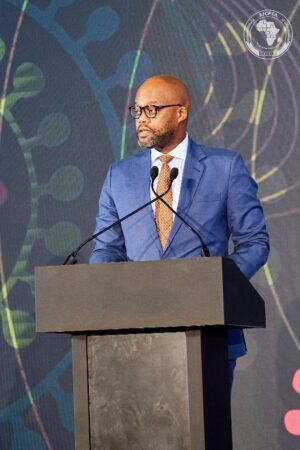 x
x
As we look to the future, the promise of gold tokenization is clear, but so are the risks. To realize its full potential, we must proceed with diligence, foresight, and collective action.
The good news is: we are not starting from scratch. The AfCFTA is already transforming Africa’s trade landscape, providing the foundational framework for this endeavour. This is critical because the vision of “Gold Without Borders” aligns deeply with Africa’s broader strategic goals under Agenda 2063, the African Mining Vision, and the AU Commodities Strategy.
With 49 State Parties and a market of 1.4 billion people, AfCFTA provides the market scale, legal certainty, and regulatory clarity needed for innovation to flourish.
Through the AfCFTA, we are bridging fragmented markets and building regional value chains, from mining to refining to manufacturing. Our rules of origin and product standards now encourage beneficiation and industrialization across the continent.
Gold without borders
…tokenization and the next chapter in African trade
Speech by Wamkele Mene, Secretary General, African Continental Free Trade Area (AfCFTA) Secretariat at 2025 Mining in Motion Summit
We meet at a time of profound global uncertainty, marked by shifting geopolitics, rising protectionism, and persistent trade and financial fragmentation. The lingering impacts of pandemics, climate shocks, and inflation have further exposed deep vulnerabilities in global supply chains. In this evolving environment, Africa must respond with clarity and unity.
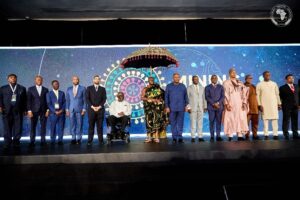
This imperative is reinforced by ongoing strategic competition, increasingly defined by ‘me-first’ policies. This dynamic makes it all the more urgent for Africa to deepen continental integration, strengthen resilience, and assert its economic interests more boldly on the global stage, especially as changes in global trade policies, including the uncertain future of AGOA, could significantly affect our economies.
Thankfully, the operationalisation of the AfCFTA offers a transformative opportunity to drive growth and sustainable development from within. It is a home-grown initiative rooted in Africa’s own vision for prosperity. As a flagship project of Agenda 2063, the AfCFTA embodies our collective ambition to boost intra-African trade, foster industrialization, and enhance our global economic influence.
Key to the success of this agenda is digitalisation. Digital technologies are not only enablers, they are the lifeblood of Africa’s emerging integrated economy. They provide the efficiency, transparency, and connectivity essential to realising the full potential of the AfCFTA.
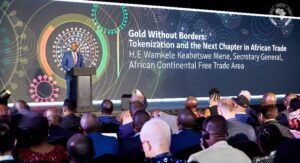
With the AfCFTA Protocol on Digital Trade now fully adopted, and as we shift from negotiation to implementation, the theme of my address: “Gold Without Borders: Tokenization and the Next Chapter in African Trade”; could not be more timely. It speaks directly to how Africa can harness digital innovation to transform traditional sectors like mining.
Gold tokenization offers a practical demonstration for operationalizing the AfCFTA’s digital framework: reducing transaction costs, boosting intra-African trade, improving traceability, and enhancing financial inclusion. This not only reinforces the AfCFTA’s commitment to value addition and rules-based trade, but also serves as an example of the forward-looking, inclusive innovation we must champion across our continent.
This is not just about gold, it is about redefining the future of African trade in the digital age.
For us at the AfCFTA Secretariat, today’s dialogue is especially important. It directly builds on the momentum of our recent and highly successful Digital Trade Forum 2025, held in Lusaka, Zambia. The Forum was dedicated to operationalizing the Protocol on Digital Trade under the theme: “Boosting Digital Trade to Accelerate AfCFTA Implementation”. The Forum reaffirmed Africa’s digital trade potential, political commitment, and country readiness, while laying vital groundwork for capacity-building, especially for SMEs, women, and youth. It underscored the urgent need for interoperable systems and harmonized regulations to establish a trusted continental digital market. This momentum makes today’s dialogue both timely and strategic.
Africa is a major gold producer, contributing over 1,000 tonnes in 2023; more than 27% of global output. This represents a significant source of wealth, with a large share coming from artisanal and small-scale mining, particularly in countries like Ghana. Howver, despite this wealth, up to 40% of Africa’s gold remains undeclared, with an estimated $30 billion smuggled annually. This deprives governments of vital revenue, undermines ethical sourcing, and limits miners’ access to finance.
Much of Africa’s gold is exported in raw form, bypassing opportunities for value addition, job creation, and industrial development. In many ways, it remains a symbol of untapped potential; abundant yet underserved by policy, infrastructure, and formal markets.
Tokenization offers a way to change that. By representing physical gold digitally on secure blockchain platforms, tokenization enables traceable, near-instant cross-border trade. Globally, this model is gaining traction, with over $2 billion in tokenized gold assets as of 2024, signaling rising investor confidence.
For Africa, the potential benefits are significant. Tokenization could reduce transaction costs, expand financial inclusion, and strengthen intra-African trade. It offers the promise of greater transparency, curbing illicit flows, and empowering small-scale miners by linking them to formal markets and credit.
As a verifiable and secure asset backed by audited reserves, tokenized gold could also serve as a more stable store of value in the face of currency volatility and help unlock new trade finance opportunities.
Importantly, it helps verify origin and local content, a key condition for preferential trade under the AfCFTA. By tracking gold through supply chains, tokenization ensures fair value distribution and strengthens compliance with rules of origin.
We are already seeing early progress:
- InGhana, the new Ghana Gold Board is introducing blockchain-based tracking to formalize production and curb smuggling.
- InSouth Africa, Scoin and Pundi X offer retail access to tokenized LBMA gold, blending innovation with financial inclusion.
- TheCentral African Republic’s Sango Project aims to tokenize gold as part of a broader digital economy strategy.
- Minexx is helping artisanal miners across jurisdictions certify sourcing and access finance.
- At thecontinental level, the African Development Bank has proposed a mineral-backed unit of account to boost macroeconomic stability and intra-African trade.
These initiatives signal a decisive move beyond extractive models toward a future where Africa’s gold is traceable, digitally tradable, and more inclusive, driving growth, resilience, and regional integration under AfCFTA.
As we look to the future, the promise of gold tokenization is clear, but so are the risks. To realize its full potential, we must proceed with diligence, foresight, and collective action.
The good news is: we are not starting from scratch. The AfCFTA is already transforming Africa’s trade landscape, providing the foundational framework for this endeavour. This is critical because the vision of “Gold Without Borders” aligns deeply with Africa’s broader strategic goals under Agenda 2063, the African Mining Vision, and the AU Commodities Strategy.
With 49 State Parties and a market of 1.4 billion people, AfCFTA provides the market scale, legal certainty, and regulatory clarity needed for innovation to flourish.
Through the AfCFTA, we are bridging fragmented markets and building regional value chains, from mining to refining to manufacturing. Our rules of origin and product standards now encourage beneficiation and industrialization across the continent.
The Protocol on Investment, in turn, tackles regulatory fragmentation by reducing bureaucratic hurdles and aligning investment laws, thereby making it easier and more cost-effective for investors to operate across borders.
We are also laying the digital foundation for a modern African economy. The Protocol on Digital Trade, the Digital Identity Project and the Pan-African Payment and Settlement System, are all critical to creating a connected environment where tokenized trade can thrive. Furthermore, the US$10 billion Adjustment Fund is supporting countries and businesses as they adapt to this new trade regime, including those in the mining sector.
But if we want to fully advance the vision of Gold Without Borders, we need to get a few fundamentals right.
First, legal clarity. What exactly does a digital token represent: ownership, a legal claim, or merely a contractual promise? How is that right transferred, enforced, or contested, particularly across jurisdictions? Without clear, cross-border legal definitions and enforceable property rights, we cannot build trust or scale investment.
Second, sound and harmonized regulation is essential. Member States must align on AML/KYC standards, legal recognition of tokenized assets, and secure cross-border frameworks. Blockchain’s transparency should reinforce, not undermine, financial integrity.
Third, we need urgent investment in resilient and interoperable digital infrastructure to support African-owned platforms and protect against evolving threats. Tokenization must reach beyond capital cities. It must be usable in rural mining communities. That means secure storage, user-friendly wallets, and blockchain platforms that are inclusive and reliable.
Fourth, we must also build institutional capacity. Regulators, financial institutions, and legal systems need a deep understanding of blockchain and digital assets to ensure governance is proactive, not reactive. Importantly, capacity-building initiatives for African youth and small enterprises are essential; a highlight of our recent Digital Trade Forum was the launch of the AfCFTA Digital Skills and Entrepreneurship Programme, designed to bridge Africa’s digital skills gap and empower new entrepreneurs.
Fifth, trust must be built and maintained. Independent third-party audits, secure custody, and strong governance are non-negotiable to assure users and investors. Furthermore, growth must be responsible. The tokenized gold ecosystem must reflect Africa’s values, ensuring transparency, ESG compliance, and sustainable sourcing, as enshrined in the African Mining Vision.
Sixth, central bank leadership is key. As stewards of financial stability, central banks play a critical role in integrating tokenized gold into national systems and facilitating seamless settlement via platforms such as the PAPSS.
Ultimately, realizing the vision of “Gold Without Borders” will not happen by chance. It demands shared purpose, strategic leadership, and a strong commitment to building a secure, inclusive, and sustainable future for Africa. This will require strong partnerships among governments, central banks, fintechs, miners, and communities. Public-private collaboration is the only way to design balanced, forward-looking policies that attract long-term investment and foster inclusion.
As I conclude, let me emphasize that we stand at a defining moment for our continent. While progress is visible, the challenges remain real. But so too is our resolve to shape a future where Africa’s resources uplift all its people. This calls for bold but pragmatic action driven by shared purpose and collective responsibility.
Africa’s gold has long been a symbol of wealth. Now, through innovation and collaboration, we can turn it into a true engine of inclusive growth. Tokenization presents that opportunity: to build secure, transparent, and integrated markets where value is created, retained, and shared.
Globally, tokenization is rapidly becoming the go-to method for bringing real-world assets (RWAs) on-chain. So, while the space is still evolving, the time to act is now. With sound governance and coordinated action, we can build a trusted ecosystem where Africa’s gold, digitized and democratized, drives a new era of integration and prosperity.
I urge all stakeholders here today to see digital trade not as a future goal, but as an immediate necessity. Africa can and must build a thriving, inclusive digital economy under the AfCFTA.
The AfCFTA Secretariat remains fully committed to building a competitive and inclusive digital single market. As we advance the Protocols on Digital Trade and Investment and support Member States in modernizing customs and digital identity systems, our focus is equally on future-proofing Africa’s regulatory environment.
In this context, we are also prepared to work closely with Member States, the African Union Commission, and other stakeholders to explore a unified Pan-African digital asset regulatory framework. Aligned with the AfCFTA Protocols and the AU Digital Transformation Strategy, such a framework would not only harmonize standards and enhance market interoperability, but also unlock the investment and innovation necessary to position Africa at the forefront of the global digital economy.
The Protocol on Investment, in turn, tackles regulatory fragmentation by reducing bureaucratic hurdles and aligning investment laws, thereby making it easier and more cost-effective for investors to operate across borders.
Weare also laying the digital foundation for a modern African economy. The Protocol on Digital Trade, the Digital Identity Project and the Pan-African Payment and Settlement System, are all critical to creating a connected environment where tokenized trade can thrive. Furthermore, the US$10 billion Adjustment Fund is supporting countries and businesses as they adapt to this new trade regime, including those in the mining sector.
But if we want to fully advance the vision of Gold Without Borders, we need to get a few fundamentals right.
First, legal clarity. What exactly does a digital token represent: ownership, a legal claim, or merely a contractual promise? How is that right transferred, enforced, or contested, particularly across jurisdictions? Without clear, cross-border legal definitions and enforceable property rights, we cannot build trust or scale investment.
Second, sound and harmonized regulation is essential. Member States must align on AML/KYC standards, legal recognition of tokenized assets, and secure cross-border frameworks. Blockchain’s transparency should reinforce, not undermine, financial integrity.
Third, we need urgent investment in resilient and interoperable digital infrastructure to support African-owned platforms and protect against evolving threats. Tokenization must reach beyond capital cities. It must be usable in rural mining communities. That means secure storage, user-friendly wallets, and blockchain platforms that are inclusive and reliable.
Fourth, we must also build institutional capacity. Regulators, financial institutions, and legal systems need a deep understanding of blockchain and digital assets to ensure governance is proactive, not reactive. Importantly, capacity-building initiatives for African youth and small enterprises are essential; a highlight of our recent Digital Trade Forum was the launch of the AfCFTA Digital Skills and Entrepreneurship Programme, designed to bridge Africa’s digital skills gap and empower new entrepreneurs.
Fifth, trust must be built and maintained. Independent third-party audits, secure custody, and strong governance are non-negotiable to assure users and investors. Furthermore, growth must be responsible. The tokenized gold ecosystem must reflect Africa’s values, ensuring transparency, ESG compliance, and sustainable sourcing, as enshrined in the African Mining Vision.
Sixth, central bank leadership is key. As stewards of financial stability, central banks play a critical role in integrating tokenized gold into national systems and facilitating seamless settlement via platforms such as the PAPSS.
Ultimately, realizing the vision of “Gold Without Borders” will not happen by chance. It demands shared purpose, strategic leadership, and a strong commitment to building a secure, inclusive, and sustainable future for Africa. This will require strong partnerships among governments, central banks, fintechs, miners, and communities. Public-private collaboration is the only way to design balanced, forward-looking policies that attract long-term investment and foster inclusion.
As I conclude, let me emphasize that we stand at a defining moment for our continent. While progress is visible, the challenges remain real. But so too is our resolve to shape a future where Africa’s resources uplift all its people. This calls for bold but pragmatic action driven by shared purpose and collective responsibility.
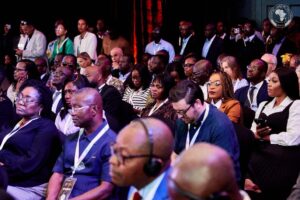
Africa’s gold has long been a symbol of wealth. Now, through innovation and collaboration, we can turn it into a true engine of inclusive growth. Tokenization presents that opportunity: to build secure, transparent, and integrated markets where value is created, retained, and shared.
Globally, tokenization is rapidly becoming the go-to method for bringing real-world assets (RWAs) on-chain. So, while the space is still evolving, the time to act is now. With sound governance and coordinated action, we can build a trusted ecosystem where Africa’s gold, digitized and democratized, drives a new era of integration and prosperity.
I urge all stakeholders here today to see digital trade not as a future goal, but as an immediate necessity. Africa can and must build a thriving, inclusive digital economy under the AfCFTA.
The AfCFTA Secretariat remains fully committed to building a competitive and inclusive digital single market. As we advance the Protocols on Digital Trade and Investment and support Member States in modernizing customs and digital identity systems, our focus is equally on future-proofing Africa’s regulatory environment.
In this context, we are also prepared to work closely with Member States, the African Union Commission, and other stakeholders to explore a unified Pan-African digital asset regulatory framework. Aligned with the AfCFTA Protocols and the AU Digital Transformation Strategy, such a framework would not only harmonize standards and enhance market interoperability, but also unlock the investment and innovation necessary to position Africa at the forefront of the global digital economy.

